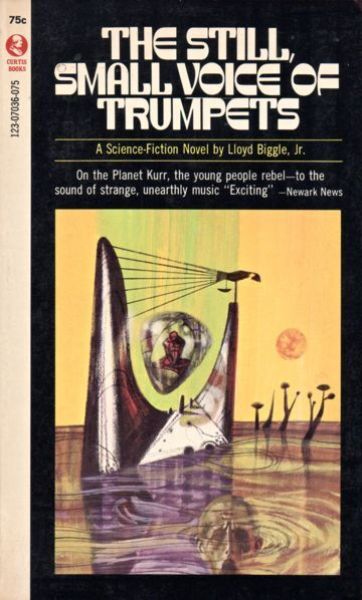Gonna Rise Up
The Still, Small Voice of Trumpets (Interplanetary Relations Bureau, volume 1)
By Lloyd Biggle, Jr.

11 Jul, 2021
Lloyd Biggle, Jr.’s 1968 The Still, Small Voice of Trumpets is the first of Biggle’s Interplanetary Relations Bureau works.
Seconded to the Interplanetary Relations Bureau (IPR), Cultural Survey agent Jef Forzon arrives on the non-Federation world Gurnil without orders in hand and with no clear idea what his duties are to be. Local IPR Coordinator Rastadt offers little illumination; he claims that he’s as surprised to see Forzon on Gurnil as Forzon is to have been sent to the backwater world.
Forzon soon discovers that Gurnil is a sore point for the IPR. It is the planet where IPR careers go to die and has been for four centuries.
The Federation of Independent Worlds is an ancient galactic organization, all of whose member states are planetary democracies. The Interplanetary Relations Bureau monitors non-member worlds, waiting until each world achieves planetary democracy and becomes qualified to join the Federation.
No doubt IPR agents would be tempted to shove worlds along down the path towards democracy were it not for the IPR credo that “DEMOCRACY IMPOSED FROM WITHOUT IS THE SEVEREST FORM OF TYRANNY.” The IPR therefore restricts itself to subtle methods. For the most part these are successful. Not on Gurnil.
Gurnil has two continents, Larnor and Kurr. Larnor has achieved democracy. Kurr remains an absolutist monarchy, beset by all the problems inherent in such governments. Kurr differs from most absolute monarchies in that while its kings have been the usual mix of benign and malevolent, all of them seem to have had a fine-tuned sense of just how far they can push their subjects. Life in Kurr may be repressive but it’s not so bad that the masses are forced to revolt. The very concept of protest is alien to Kurr.
Forzon specializes in art, a field with which the local IPR staff are utterly unfamiliar and whose utility to the great project of democratization is unclear to them. Nevertheless, when Forzon’s orders are belated discovered to have been somehow misfiled, he is sent on his way to Kurr, where he is to head Team B, the IPR team based there.
Forzon no sooner arrives in Kurr than he discovers that the disguise with which he was provided was calculated to provoke his arrest. Kurr is not merely highly resistant to change. Someone on the IPR team is actively sabotaging efforts to reform Kurr, for a purpose about which Forzon and his Team B allies can only speculate. Never mind subtly transforming Kurr into a modern state: Team B will be hard pressed to evade Kurr’s dungeons.
~oOo~
The Interplanetary Relations Bureau series consists of two novels (The Still, Small Voice of Trumpets (1968), and The World Menders (1971)) and five short stories (“The King Who Wasn’t” (2001), “Perchance to Dream” (2002), “The Pristine Planet” (2003), “Of the Zornler, by the Zornler …” (2003), “The Problem of the Gourmet Planet” (2003)). I am a bit surprised, because I thought there were more novels. Perhaps I got it confused with the Jan Darzek series?
While it’s not clear how long the Federation has existed, the organization is old enough that investing four hundred years on a failed project is merely mildly embarrassing. Sequestering non-member worlds for a thousand years (worlds that have become aware of the IPR) is more of an inconvenience than a catastrophe.
One consequence of this antiquity is that regulations have accumulated over the millennia. Thus IPR Field Manual 1048K: a dense tome it takes IPR agents three years to master, a brick filled with all-caps directives like:
THE BUREAU DOES NOT CREATE REVOLUTION. IT CREATES THE NECESSITY FOR REVOLUTION. GIVEN THAT NECESSITY, THE NATIVE POPULATIONS ARE PERFECTLY CAPABLE OF HANDLING THE REVOLUTION.
and
DEMOCRACY IS NOT A FORM OF GOVERNMENT; IT IS A STATE OF MIND. PEOPLE CANNOT BE ARBITRARILY PLACED IN A STATE OF MIND.
Such directives suggest that long ago the IPR tried overt intervention, which went poorly.
There’s probably a maxim to the effect that any work that features a non-interference doctrine will then focus almost entirely on efforts to circumvent it. In this case, efforts to nudge alien societies towards democracy are only forbidden to the extent they are noticed by natives. The sotto voce addendum to “DEMOCRACY IMPOSED FROM WITHOUT IS THE SEVEREST FORM OF TYRANNY” is “so don’t get caught imposing it.”
In a seeming concession to frustrated field agents, the IPR Rule of One permits its agents to introduce one single technological innovation to any given world, the catch being that most devices that inspire social revolutions require knowledge of dozens of new techniques.
By selecting as protagonist someone from outside the IPR, Biggle provides a protagonist to whom all of the above must be explained. It soon becomes clear that this particular Cultural Survey agent can offer a perspective on Kurr culture that the other IPR field agents cannot. Interesting. The general trend in SF, particularly of this era, is for crucial insights to be the domain of STEM experts. The situation on Kurr demanded someone with a background in art.
Despite the page constraints imposed by 1960s SF publishers, Biggle manages to cram a fair amount of intrigue, action, and derring-do into a slender novel.
The Still, Small Voice Of Trumpetsis available here (Amazon US), here (Amazon Canada), here (Amazon UK), here (Barnes & Noble), here (Book Depository), and here (Chapters-Indigo).
